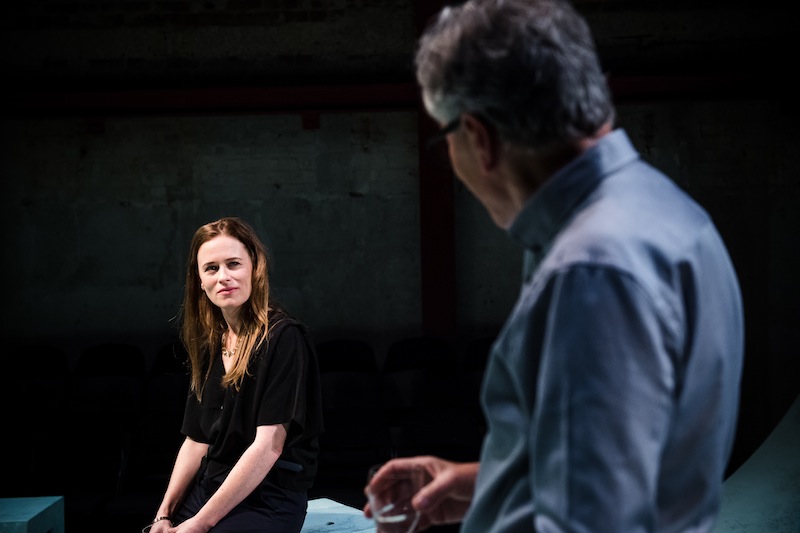Adultery seldom looks less adult than in the form of the mild-life crisis – that much-satirised condition in which desire is eclipsed by delusion, wisdom by foolishness, and sensible coats by leather jackets. Joanna Murray-Smith’s scalpel-sharp drama – first performed in Australia in 1995 (and acted here at the National Theatre in 2003 with Corin Redgrave and Eileen Atkins in the starring roles), now revived at the Park Theatre - triumphs because it anatomises marital breakdown with a cold-eyed clarity that goes beyond cliché to ask profound questions about the meaning of love decades after the romance has evaporated.
Paul Robinson’s witty, slick production takes place on Liz Cooke’s elegantly abstract ice-blue set, which swoops up in one corner with the confidence of a wave only to crumple at the top in a mess of battered, rusty metal. At the start the characters – George, an ageing author, his wife Honor, Claudia, a brilliant young journalist, and Sophie, the couple’s grown-up daughter – arrange themselves formally around the stage edges as if they are pawns in an elaborate board-game.
Robinson has assembled a crack cast, headed up by Henry Goodman as the urbane, hyper-articulate George and Imogen Stubbs as his clever, exasperated wife. The moment the pawns begin to move – with George being flattered in an interview by the ambitious Claudia - we can all predict precisely what the next stage in this marital game will be, yet how we feel will prove another matter.
Murray-Smith’s brilliant, thought-provoking move is to make the first encounter between Katie Brayben’s charmingly predatory Claudia (below) and Honor a question of why the vast majority of wives place their careers and ambitions behind their husbands’. "Some women use loyalty as a way of justifying their sacrifice of themselves," Claudia declares. "I think love gets suffocated in inequality."
It’s a declaration that comes with a sting, even at a time when the tide in gender inequality is turning. At the same time as we laugh at how self-serving Claudia’s line of questioning is, we see how it starts to reinvent Honor. Stubbs brilliantly acts out the slow metamorphosis from witty contentment to an outrage as fierce as it is graceful about why she has never achieved her full potential. She is of course helped in no small part by her husband’s desertion of her for Claudia. "I feel like I’m dying," he declares. "I’m not ready to die yet". Goodman eloquently conveys the self-protecting vanity of a man who, for all his brilliance and articulacy, cannot prevent himself from stumbling into a sub-romantic cliché. Yet the disconcerting question once again is whether it is now that he is doing his wife the injustice, or whether it was the moment when he decided that her ambition came second to his.
She is of course helped in no small part by her husband’s desertion of her for Claudia. "I feel like I’m dying," he declares. "I’m not ready to die yet". Goodman eloquently conveys the self-protecting vanity of a man who, for all his brilliance and articulacy, cannot prevent himself from stumbling into a sub-romantic cliché. Yet the disconcerting question once again is whether it is now that he is doing his wife the injustice, or whether it was the moment when he decided that her ambition came second to his.
Good writing sees the humanity in everyone – however flawed and twisted it is – and perhaps the most moving encounter of the evening is between Brayben’s Claudia and Natalie Simpson’s emotionally frank, conflicted Sophie. "I think I’m saving her life," Claudia says of Honor to Sophie. Instead of punching her, Sophie’s response is one of the most articulate expressions of inarticulacy and confusion you’ll ever hear on-stage. It culminates in an extraordinary confession that while she hates Claudia for her actions, "I wish I was more like you".
If this makes it sound as if Claudia emerges as some kind of warped heroine from the evening, she doesn’t. The play’s subtle allure is that the more articulate and assured each character sounds, the more the chasm of self-doubt opens beneath their feet. There are no happy endings here, but equally there are no easy recriminations. Honour is an assault on any kind of complacency, and one that should keep audience members thinking for several days afterwards.
- Honour at the Park Theatre until 24 November
- Read more theatre reviews on theartsdesk














